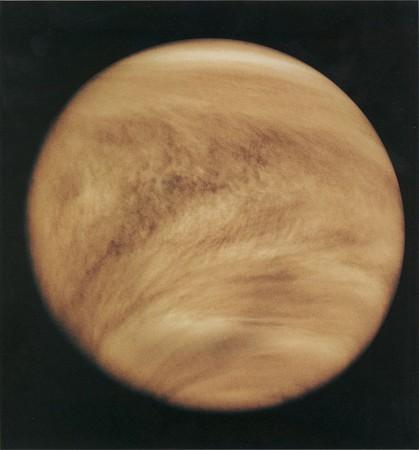
The sulfuric acid-rich atmosphere of Venus, the closest neighbor to Earth in the Solar System, has the right conditions to host a variety of extraterrestrial life. The lower clouds of Venus have been found to have the right amount of pressure and temperature to actually support life.
Venus' lower cloud layers that lie between 47.5km and 50.5km from its surface, according to a study published in Astrobiology magazine, have been named an "exceptional target" for exploration of life by researchers. Apart from the acidity, the region has moderate temperatures and pressure levels of around 60 degrees C and 1 atmosphere, notes the study.
The presence of micron-sized sulfuric acid aerosols have also been seen as a positive sign for the presence of life.
Possibility of life on Venus has been a hotly-debated subject for decades now; even Carl Sagan had published a paper in 1967 on the topic. The idea for this recent study was the well-known, light absorbing patches of cloud-like formations in the planet. Researchers now think that these cloud formations could be similar to algal blooms found on Earth, absorbing sunlight and using it for energy. These particles have been found to be of a similar size and shape to algae as well.
This, however is still a hypothesis and the clouds need to be actually sampled and tested. "To really know, we need to go there and sample the clouds," Biological Chemist Rakesh Mogul, study co-author and professor at California State Polytechnic University, Pomona, said in a statement. "Venus could be an exciting new chapter in astrobiology exploration."
"Venus has had plenty of time to evolve life on its own," explains Sanjay Limaye of the University of Wisconsin-Madison's Space Science and Engineering Center, who led the study. He noted that some models suggest Venus could have had liquid water on its surface and a habitable climate for as long as 2 billion years. "That's much longer than is believed to have occurred on Mars," reports ScienceDaily.
What kind of life are the scientists hoping to find on Venus?
Microbial life that lives primarily in the atmosphere. Even here on Earth, bacteria has been recorded to not just survive, but thrive in the atmosphere, sometimes up to 41 km in the air. These microbes have also been recorded in extremely harsh conditions such as the Yellowstone pools and thermal volcanic vents. Expecting similar extreme creatures on Venus does not seem like that much of a stretch at this point.








